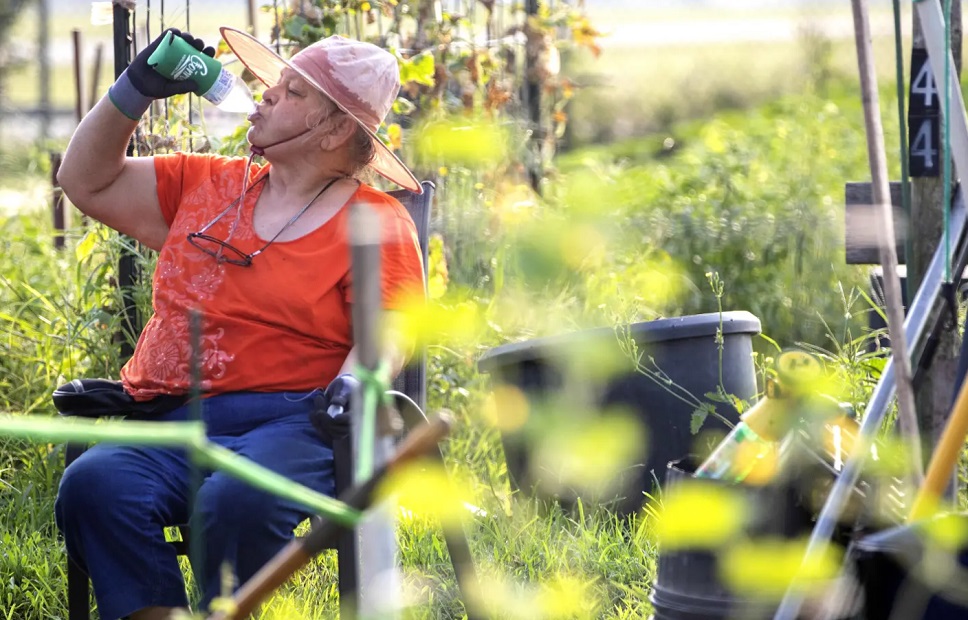
AUSTIN, Texas —On June 16, Felipe Pascual, a 46-year-old construction worker pouring cement in Missouri City, Texas, during the Lone Star State’s current ultra-heat wave, collapsed and died of heat stroke.
Just days afterwards, Eugene Gates, 66, a Letter Carriers Branch 132 member since 1987, collapsed and died—of the same cause—while walking his route in the Lakewood neighborhood outside of Dallas. Efforts to revive him using CPR (cardiopulmonary resuscitation) were unsuccessful.
But now that radical right-wing Republican Gov. Greg Abbott, the gerrymandered radical right Republican majority in the state legislature, and the corporate interests who back them have had their way, a lot more workers may follow Pascual and Gates to their graves, starting September 1.
That’s because lawmakers approved, and Abbott, who lobbied hard for it, signed HB2172, nicknamed the “Death Star Bill.” Like death stars in sci-fi films, the new law kills everything in sight.
In this case, it kills Texas local governments’ future power to approve ordinances and regulations in a wide range of pro-worker areas—everything from raising the minimum wage to cutting deaths from heat stroke. And the Death Star law repeals past local ordinances, too. It’ll kill people, too, foes state.
Texas, like much of the country, has been in the grip of a massive and scorching heat wave. It particularly puts outdoor workers—Letter Carriers, sanitation workers, Postal Workers, construction workers, farm workers, and longshore workers among them—at high risk of heat-caused deaths.
Jordan Barab, editor of the Confined Space blog, and a former Deputy Occupational Safety and Health Administrator, reports there have been 13 heat-related deaths in Texas this year alone. And that was before Pascual and Gates collapsed. 100-degree heat has been the minimum, it seems.
“Texas is already the state with the most work-related heat deaths in the country. But that’s not good enough for Greg Abbott. Sometimes you just have to kill a few workers to make your political point,” Barab wrote.
The federal Occupational Safety and Health Administration realizes there’s a danger, but corporate interests have hamstrung its efforts to write a national rule to force employers to protect their workers against high heat. So OSHA’s turned to guidance for employers, and a beat-the-heat package of moves workers can take to protect themselves. It’s available at www.osha.gov.
They include simple solutions such as frequent rest breaks in the shade, drinking lots of water, limited hours in the high heat of mid-day, and so on. And, as Barab points out, air conditioning.
Gates’ death prompted Letter Carriers President Brian Renfroe to put out an NALC-wide reminder to his members to protect themselves. He has good reason: NALC formal complaints to OSHA show 13 heat-caused deaths of Letter Carriers from 2012-17 alone nationwide.
And that’s not counting others who died since, such as the Letter Carrier who died from excessive heat in Woodland Hills, Calif., in 2018, or Gates. OSHA fined the Postal Service almost $150,000 for the California carrier’s death.
“Unmitigated excessive heat can cause heat stress, often resulting in serious illness or death,” Renfroe warns. “Unfortunately, we have seen far too many examples of this over the last several years, including in 2023. This hazard becomes a greater threat every year, as science shows that temperature and heat indices are steadily increasing.
“Over the last decade, NALC has fought fiercely in a number of forums to protect Letter Carriers by insisting the Postal Service create and enforce a comprehensive heat illness prevention program (HIPP) that protects our members by mitigating the hazard posed by excessive heat.
“We participated in extensive litigation with the Postal Service” and OSHA and lobbied federal, state, and local lawmakers on the issue, he added.
That lobbying paid off in major Texas cities. Several, including Dallas, Austin, and San Antonio, passed ordinances to protect workers against excessive heat. Other cities, notably Houston, stepped in with other pro-worker ordinances of their own on everything from raising the minimum wage to mandating paid sick leave to banning predatory payday lenders.
Then Abbott and the legislature got into the act. At corporate behest and with Abbott’s active lobbying, lawmakers passed HB2172, which he eagerly signed. All to create a better business climate in the already too-corporate-friendly Texas, Barab notes.
You name it, and the legislature and Abbott repealed it, all at business behest. On September 1, local laws and rules covering everything from picking crops in excessive heat to local minimum wages to—in Austin—water breaks every four hours for construction workers will be gone.
And the cities and counties can’t pass any future ordinances governing nine fields: “Agriculture, business and commerce, finance, insurance, labor, local government, natural resources, occupations, and property,” according to Barab and the Texas Tribune.
“For those asking: Neither state nor federal law provides rest breaks for construction workers, and OSHA’s General Duty Clause does not require employers to take any specific action to protect employees working in dangerously high temperatures, no matter how high the heat index,” the state AFL-CIO tweeted.
“That is why cities in Texas took it into their own hands to protect workers. HB2127 not only rolls back the local rest break requirements that have been passed, but it also blocks all Texas cities from passing similar protections.”
No wonder Domingo Garcia, national president of the League of United Latin American Citizens, called Abbott and the Texas Republicans “heartless politicians who turned Texas into a plantation/patron 1900s system once again.” HB2127, Garcia concluded, “is tantamount to a potential death sentence for Latino and Texas workers.”
We hope you appreciated this article. At People’s World, we believe news and information should be free and accessible to all, but we need your help. Our journalism is free of corporate influence and paywalls because we are totally reader-supported. Only you, our readers and supporters, make this possible. If you enjoy reading People’s World and the stories we bring you, please support our work by donating or becoming a monthly sustainer today. Thank you!












Comments